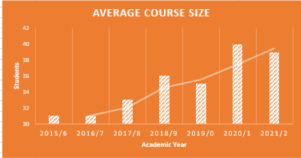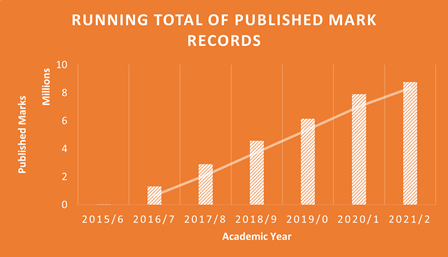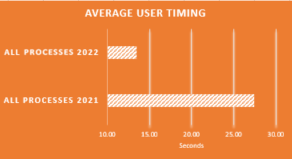Top marks for EUCLID changes
Key changes have been made to the University of Edinburgh’s Student Systems to help staff and students publish and access their assessment and course results.

Teams from the Student Systems Partnership and Operations, Development Technology and Production Management have tackled performance issues relating to the University’s coursework and results systems – known as Assessment and Progression Tools (APT).
Enhancements in database queries in the University’s web portal EUCLID, performance monitoring and system infrastructure have successfully reduced publication and page load times and eliminated outages.
Background and issues reported
The changes made to APT come as more and more students are choosing to study at UoE. Average course cohort sizes have been increasing since 2015 and they now sit at around 40 students per course.
However, some courses attract even larger numbers of students. These courses have seen their student numbers double since 2015 when the largest had around 350 students.
This year the largest courses have around 850 students, and this has led to new challenges for the APT systems – impacting performance of screens used by staff to enter marks and process results.
APT are used by University Schools and Deaneries to calculate and publish course results, annual progression decisions and degree classifications, which can then be accessed by students in EUCLID.

They were first piloted in seven University Schools in the 2015/16 academic year but have since been rolled out across all Schools and Colleges.
More than a million course results and assessments marks are published to students through APT each academic year.
However, during the 2020/21 academic year, performance problems in APT began to be reported.
These were caused and exacerbated by the sheer volume of data held in the EUCLID database – which now encompasses almost nine million marks – as well as changing user behaviour and more assessments within courses.
Issues reported included screens used by staff to enter marks failing to load and system wide outages as course result publication deadlines put too much strain on the APT system.
Solutions
To overcome these issues the Student Systems Partnership completed a number of changes and enhancements ahead of the semester one exam board period in 2022. These were:
(1) Rewriting part of EUCLID database queries for efficiency
(2) Analysing database queries and adding extra indexes to improve query performance
(3) Addition of extra timings for analytics to monitor performance
(4) Enhancements to infrastructure by directing student traffic to the read only database to check their published marks, leaving the transactional database for staff publishing marks
Benefits and outcomes

These have resulted in year-on-year net improvement in undergraduate marks publishing – with 91% of marks published by the deadline.
The average time to publish course results in the week leading up to the deadline has also improved since 2021.
Moreover, average page load times for students viewing course and assessment results were lower in 2022 – even with a greater number of page views than 2021.
There were also improvements in the performance of bulk processes, used by staff to perform tasks like calculating and publishing course results, and average user timing across all processes.
Since the enhancements were made no issues or outages have been reported by staff or students.
Further improvements are already in the pipeline for the EUCLID student view of assessments and are set to be delivered ready for summer publication deadlines.

